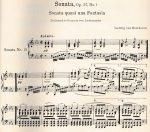On classical favourite is Beethoven. (image from Schirmer’s Library of Musical Classics)
Music, my love! Where can one start with this subject? For many, it is a highly emotional issue. Watching young people at a rave or rock concert, we can see how totally they are consumed by the sounds, the words and the experience. Though it may leave profound traces in what they become, in the person they are, other priorities will ultimately dictate their behaviour. Nevertheless, don’t so many of us retain some place in our being where the music of our youth, once recalled, takes us back to those times with immediacy, carrying with it all its emotional weight? All the good and all the bad!
Carried away by a political consciousness early in my growing up years, I missed all that. Busy, busy, busy. My attitude was coloured somewhat by having had music thrust down my throat by a mother who felt that no education was complete without a person having the capacity to play a musical instrument. To my distress, the violin was her instrument of choice – weren’t there all those famous virtuosos Jewish? But, my output was in continuous dissonance with the beautiful music I heard in my head, no matter how hard I practised. I struggled with it for a number of years, while my sister achieved some facility, until my teacher suggested I could more productively focus my efforts on attaining celebrity in basketball, where I, as a short person, also had unreasonable expectations. I did, however, gain an appreciation of how beautiful music could be when offered by those with talent.
It was the folk music of the ’60s, the music of protest and rebellion, that most marked my consciousness in those early years. I trafficked in other forms, but it was the emotional appeal of that particular material that captured me. Some of it can still bring me to tears. Over time, though, a few favourite classical works were accumulated as top of mind: Beethoven, Tchaikovsky, Ravel, Dvorak, mainly their stuff stirred my emotions. Gershwin, some Joni Mitchell and Dylan, Joplin and Leonard Cohen round out the picture of less formal music. Do we begin to see a pattern?
I am not an addict. I can go for long periods of time without insisting on being surrounded by melodious strains. But, when the occasion arises, and the stars are aligned, I am totally captured by the music that is available – preferably one of my favourites, but no matter. I become enraptured by the immersion. I know I am an inconstant lover, but a lover I am, nevertheless.
The right sort of music can transport me to places where I feel I could remain forever, a nirvana that wipes away all the stuff that is usually filling my head. There is so much in there, catalogues and timetables, agendas and orders of priority; for the time that I am in a place of music, these things do not exist. In some ways, music becomes for me a refuge. I do not want to imagine life without it. The need for that escape accumulates within me over time until, unconsciously, I am forced to find the occasion for relief.
I know I do music an injustice. Those involved in music-making in all its forms devote the essence of their lives to it; it is their lives. I can only imagine the sacrifices that are made, the years that are spent, by those who have had music take them by throat and totally seize their souls, so driven are they. How insulting that it should descend to being merely a palliative to one like myself!
Many of the things we need in life have their devotees. Fortunately for us, what musicians/composers are offering to us is central to their lives, so they lead a life of service to others, in many ways, without their necessary volition. For us, their raison d’etre may be only incidental, but insofar as they are consumed in making music, in all its various forms, we are blessed by their commitment to finding their joy in their métier.
As a failed musician who knows how much devotion and hard work meaningful music-making takes, I can only express my gratitude. Some of the best moments of my life – and, undoubtedly, for many others – have come from their creativity.
Can we fully express our love for another person without turning at some point to music? Can we fully express our love of country without music? Would we be willing to surrender all that music brings to our lives?
Music came into being because humanity needed this medium to express those feelings that cannot be put into words. The oldest known instrument ever found – thought to be 3,500 years old – is a five-hole flute made from a vulture’s wing bone. Anthropologists estimate, according to Wikipedia, that music is 55,000 years old and originated in Africa. It has been said that humankind fundamentally changed its nature about that long ago. Maybe music played a crucial part in that.
Regardless, I have a love affair with music. I truly believe that music was invented all those eons ago so that I could get to dance with my Bride. Care to join me on the dance floor?
Max Roytenberg is a Vancouver-based poet, writer and blogger. His book Hero in My Own Eyes: Tripping a Life Fantastic is available from Amazon and other online booksellers.

